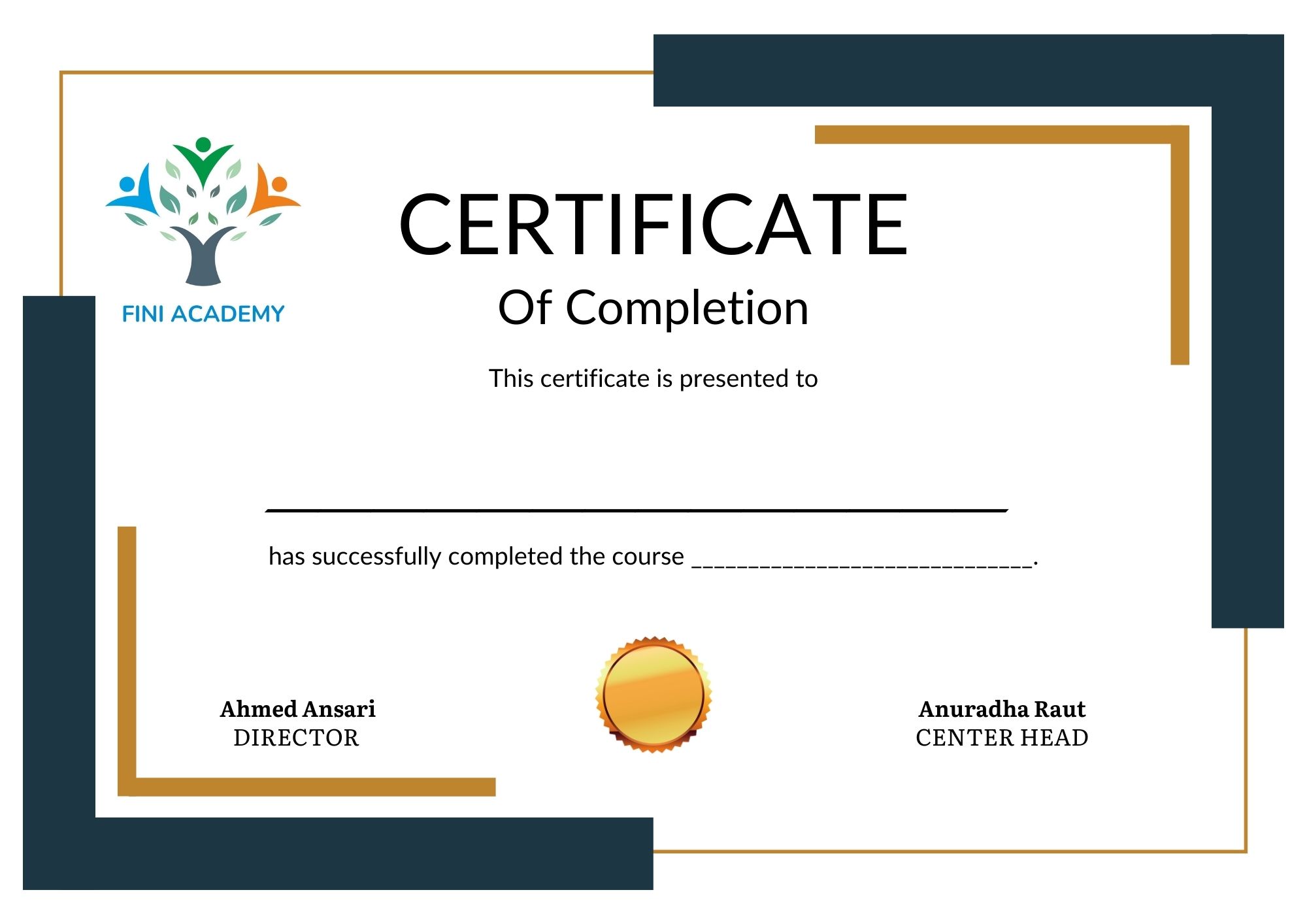- +91 90280 94499
- info@finiacademy.com
- info.finiacademy@gmail.com
 In a Microsoft SQL Server course, you will learn how to manage, query, and analyze data using SQL Server, a powerful relational database management system (RDBMS). The course typically covers topics like database design, writing and optimizing SQL queries, managing databases, and using advanced features such as stored procedures, views, and triggers. You’ll also explore performance tuning, data security, backups, and database maintenance, helping you effectively manage data in enterprise-level applications.
In a Microsoft SQL Server course, you will learn how to manage, query, and analyze data using SQL Server, a powerful relational database management system (RDBMS). The course typically covers topics like database design, writing and optimizing SQL queries, managing databases, and using advanced features such as stored procedures, views, and triggers. You’ll also explore performance tuning, data security, backups, and database maintenance, helping you effectively manage data in enterprise-level applications.
The objectives of a Microsoft SQL Server course are to equip learners with the skills to effectively manage, query, and analyze data using SQL Server. The course typically covers database creation, querying with Transact-SQL (T-SQL), managing database objects like tables and views, optimizing queries for performance, implementing security measures, and ensuring data integrity. Participants also learn how to back up, restore, and automate tasks in SQL Server, preparing them for roles in database administration, data analysis, and data engineering.
The Microsoft SQL Server course provides a comprehensive introduction to SQL Server, a popular relational database management system (RDBMS). It covers key topics such as database design, querying using SQL (Structured Query Language), data manipulation, and optimization techniques. Participants learn how to create, modify, and manage databases, tables, and indexes, as well as how to implement security and perform backups. The course also explores advanced topics like stored procedures, triggers, and performance tuning, enabling learners to manage and analyze large datasets effectively. It’s ideal for those pursuing careers in data management, analysis, or engineering.
Module 1: Introduction to Microsoft SQL Server 2012
 Introducing Microsoft SQL Server 2012
Introducing Microsoft SQL Server 2012 Getting Started with SQL Server Management Studio
Getting Started with SQL Server Management StudioModule 2: Introduction to T-SQL Querying
 Introducing T-SQL
Introducing T-SQL Understanding Sets
Understanding Sets Understanding Predicate Logic
Understanding Predicate Logic Understanding the Logical Order of Operations in SELECT statements
Understanding the Logical Order of Operations in SELECT statementsModule 3: Writing SELECT Queries
 Writing Simple SELECT Statements
Writing Simple SELECT Statements Eliminating Duplicates with DISTINCT
Eliminating Duplicates with DISTINCT Using Column and Table Aliases
Using Column and Table Aliases Writing Simple CASE Expressions
Writing Simple CASE ExpressionsModule 4: Querying Multiple Tables
 Understanding Joins
Understanding Joins Querying with Inner Joins
Querying with Inner Joins Querying with Outer Joins
Querying with Outer Joins Querying with Cross Joins and Self Joins
Querying with Cross Joins and Self JoinsModule 5: Sorting and Filtering Data
 Sorting Data
Sorting Data Filtering Data with a WHERE Clause
Filtering Data with a WHERE ClauseModule 6: Working with SQL Server 2012 Data Types
 Introducing SQL Server 2012 Data Types
Introducing SQL Server 2012 Data Types Working with Character Data
Working with Character Data Working with Date and Time Data
Working with Date and Time DataModule 7: Using Built-In Functions
 Writing Queries with Built-In Functions
Writing Queries with Built-In Functions Using Conversion Functions
Using Conversion Functions Using Logical Functions
Using Logical Functions Using Functions to Work with NULL
Using Functions to Work with NULLModule 8: Grouping and Aggregating Data
 Using Aggregate Functions
Using Aggregate Functions Using the GROUP BY Clause
Using the GROUP BY Clause Filtering Groups with HAVING
Filtering Groups with HAVINGModule 9: Using Subqueries
 Writing Self-Contained Subqueries
Writing Self-Contained Subqueries Writing Correlated Subqueries
Writing Correlated Subqueries Using the EXISTS Predicate with Subqueries
Using the EXISTS Predicate with SubqueriesModule 10: Using Table Expressions
 Using Derived Tables
Using Derived Tables Using Common Table Expressions
Using Common Table Expressions Using Views
Using Views Using Inline Table-Valued Functions
Using Inline Table-Valued FunctionsModule 11: Using Set Operators
 Writing Queries with the UNION Operator
Writing Queries with the UNION Operator Using EXCEPT and INTERSECT Using APPLY
Using EXCEPT and INTERSECT Using APPLYModule 12: Using Window Ranking, Offset and Aggregate Functions
 Creating Windows with OVER
Creating Windows with OVER Exploring Window Functions
Exploring Window FunctionsModule 13: Pivoting and Grouping Sets
 Writing Queries with PIVOT and UNPIVOT
Writing Queries with PIVOT and UNPIVOT Working with Grouping Sets
Working with Grouping SetsModule 14: Querying SQL Server Metadata
 Querying System Catalog Views and Functions
Querying System Catalog Views and Functions Executing System Stored Procedures
Executing System Stored Procedures Querying Dynamic Management Objects
Querying Dynamic Management ObjectsModule 15: Executing Stored Procedures
 Querying Data with Stored Procedures
Querying Data with Stored Procedures Passing Parameters to Stored Procedures
Passing Parameters to Stored Procedures Creating Simple Stored Procedures Working with Dynamic SQL
Creating Simple Stored Procedures Working with Dynamic SQLModule Programming with T-SQL
 T-SQL Programming Elements
T-SQL Programming Elements Controlling Program Flow
Controlling Program FlowModule 17: Implementing Error Handling
 Using TRY / CATCH Blocks
Using TRY / CATCH Blocks Working with Error Information
Working with Error InformationModule 18: Implementing Transactions
 Transactions and the Database Engine
Transactions and the Database Engine Controlling Transactions
Controlling TransactionsModule 19: Improving Query Performance
 Factors in Query Performance
Factors in Query Performance Displaying Query Performance Data
Displaying Query Performance DataTechnical Skills:
Teaching Skills:
Communication Skills:
Problem-Solving Skills:
Interpersonal Skills:
At FINI Academy, we understand that organizations need tailored training solutions to keep their teams competitive and up-to-date with the latest technological advancements. Our corporate training programs are designed to meet the unique needs of businesses, enhancing the skills of their workforce to drive innovation and efficiency.
We offer bespoke training programs that are specifically designed to align with your company’s goals and objectives. Our expert instructors work closely with you to understand your needs and develop a curriculum that addresses your specific challenges and requirements.
Industry-Relevant Curriculum Our training programs are crafted by industry experts and cover the latest trends, tools, and technologies. This ensures that your team acquires skills that are immediately applicable in the workplace.
Flexible Scheduling We offer flexible scheduling options to accommodate the busy calendars of your employees. Training sessions can be conducted at your premises, at our institute, or online, depending on what suits your organization best.
Hands-On Learning Our training emphasizes practical, hands-on learning experiences. Through real-world projects and case studies, participants gain valuable insights and the ability to apply what they’ve learned directly to their work.
Expert Instructors Our instructors are seasoned professionals with extensive industry experience. They bring practical knowledge and insights into the training sessions, making learning both engaging and impactful.
Continuous Support We provide ongoing support to ensure the success of your training initiatives. This includes post-training follow-ups, access to resources, and the availability of our instructors for any further guidance or clarification needed.
Every organization is different, and so are its training needs. Whether you are looking to upskill a small team or roll out a large-scale training initiative, we can tailor our programs to meet your specific requirements. We also offer the flexibility to focus on particular topics or technologies that are most relevant to your business.
Investing in your team’s development is crucial for staying competitive in today’s fast-paced tech landscape. Partner with FINI Academy to equip your employees with the skills they need to excel. For more information on our corporate training programs or to discuss your specific needs, please contact us at info@finiacademy.com, info.finiacademy@gmail.com or call 9028094499.
We look forward to working with you to achieve your training and development goals.
=> Our mission is to provide high-quality software training that equips students with the skills needed to excel in the tech industry.
2. Where is the institute located?=> We are located at Shop no. 2s1-16, 1st floor, konark indrayu, above HDFC bank, Meeta Nagar, Kondhwa, Pune, Maharashtra 411048. You can find detailed directions on our Contact Us page.
3. What courses do you offer?=> We offer a variety of courses including web development, data science, machine learning, mobile app development, and more. Check our Courses page for a full list.
4. What is the duration of each course?=> Course durations vary. Most of our courses range from 4 to 12 weeks. Please refer to the specific course details for more information.
5. Are the courses online or in-person?=> We offer both online and in-person courses to accommodate different learning preferences and schedules.
6. What are the prerequisites for enrolling in a course?=> Prerequisites vary by course. Some courses require basic programming knowledge, while others are designed for beginners. Please check the course details for specific requirements.
7. How do I enroll in a course?=> You can enroll in a course by visiting our website, selecting your desired course, and following the enrollment instructions. Alternatively, you can contact our admissions office for assistance.
8. What is the admission process?=> The admission process typically involves filling out an application form, meeting any prerequisites, and making a payment to secure your spot. Some advanced courses may require an interview or assessment.
9.Who are the instructors?=> Our instructors are industry professionals with extensive experience in their respective fields. You can read more about our instructors on our Faculty page.
10. What materials are provided for the course?=> Course materials, including lecture notes, assignments, and software tools, will be provided. Some courses may require additional textbooks or resources, which will be specified in the course details.
11. Will I receive a certificate upon completion?=> Yes, you will receive a certificate upon successful completion of the course.
12. Is there job placement assistance after completing the course?=> We offer job placement assistance, including resume workshops, interview preparation, and connections to our network of industry partners.
13. Can I retake a course if I don’t pass?=> Yes, we allow students to retake courses. Please contact our admissions office for details on retake policies and fees.
14. What should I do if I encounter technical issues during an online course?=> For technical support, IT support team always help during this period. We are available to assist you during business hours.
15. How can I contact the institute for more information?=> You can reach us via email at , , by phone at 9028094499, or through our Contact Us page.
16. What are the office hours?=> Our office hours are Monday to Saturday , 9 AM to 6 PM.
At FINI Academy, we strive to offer flexible and convenient scheduling to accommodate the diverse needs of our students. Our courses are designed to provide a balance between comprehensive learning and manageable time commitments.
We are committed to providing high-quality education and are always available to assist you in selecting the course and schedule that best fits your needs.
Curriculum Development:
Training Delivery:
Technical Expertise:
Assessment and Feedback:
Mentorship and Support:
Continuous Learning:
At FINI Academy, we value the feedback of our students as it helps us to continuously improve and maintain the high standards of our training programs. Below are some general insights based on student experiences:
Course Content Our students appreciate the comprehensive and up-to-date curriculum that aligns with current industry standards. The blend of theoretical knowledge and practical application ensures that participants are well-prepared for real-world challenges.
Instructors Students consistently praise our instructors for their expertise, approachability, and dedication. Our instructors are industry professionals who bring valuable real-world insights to the classroom, enhancing the learning experience.
Learning Environment Both our online and in-person classes are designed to be interactive and engaging. Students have highlighted the supportive and collaborative atmosphere that fosters effective learning.
Course Materials The provided course materials, including lecture notes, assignments, and resources, are well-received for their clarity and relevance. Students find these materials instrumental in reinforcing their learning and aiding in the application of concepts.
Support Services Our support services, including technical assistance and career guidance, are highly valued by students. The availability of job placement assistance and resume workshops has been particularly beneficial for those seeking to advance their careers.
Flexibility The flexible scheduling options are appreciated by students who are balancing their studies with other commitments. The ability to choose between online and in-person classes offers added convenience.
Overall Satisfaction Overall, students express a high level of satisfaction with our courses. Many have noted significant improvements in their skills and career prospects following the completion of our programs.
We are grateful for the positive feedback and are committed to continually enhancing our offerings based on student input. We invite prospective students to join us and experience firsthand the quality education that FINI Academy provides.


Full stack WEB development is the process of developing both the frontend and backend of applications. Any application has a frontend (user-facing) component and a backend (database and logic) component.

A full-stack Java developer is a web programmer who uses Java, a popular computer programming language. Three layers of application: front-end, back-end and database layer.

DevOps is the combination of practices and tools designed to increase an organization's ability to deliver applications and services faster than traditional software development processes.